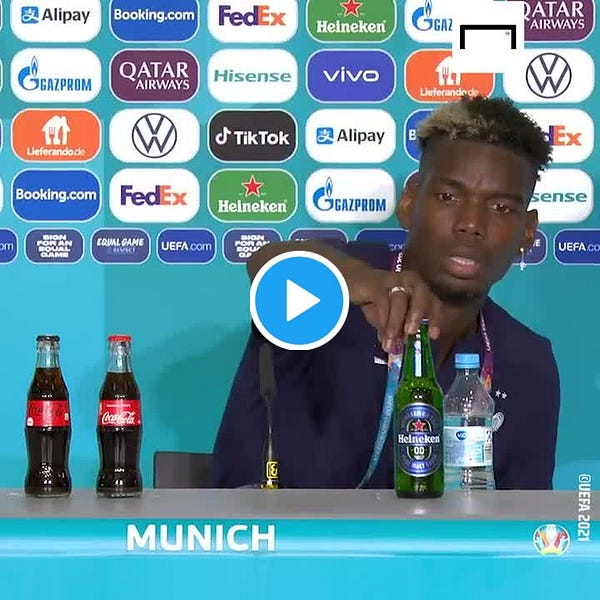We live in a world where a single, high-profile act can obliterate billions in a company’s value. Remember when Elon Musk smoked a joint on talk radio—Tesla’s shares fell by almost 10%. Ronaldo’s ‘Drink Water’ moment at the Euro cup shows just how much damage bad publicity can do. Nonetheless, Ronaldo’s Coca-Cola snub is the most extreme instalment in this saga of highly fragile, highly reactive share values for big public companies, having knocked off $4 billion in market value with the sweep of a hand.
But the bigger story here is the shifting sands under the old way of doing sports sponsorship which social media is causing. With 300 million followers, Ronaldo and people like him eclipse the sporting bodies in terms of power and visibility. Whereas the sport used to give a platform to the star, it now seems almost the opposite is true.
This creates a schism and a dilemma for UEFA. Now that the post-match moment is forever problematised, they are going to have to get a lot more creative than simply plonking down a product in front of the player. Because of social media, its likely irreversible now that stars have more power than the federations or brands. But this means that sponsorship needs to be reconsidered in every way—creatively, financially, and legally.
Forget that this sell-off was prompted by a star who has previously promoted coca-cola—the point is it was an impulsive act that shows how much power these high-visibility players wield. Since the Coca-Cola snub, France’s Paul Pogba removed a bottle of Heineken from the interview table. These sponsors have every right to start questioning their marketing budgets for UEFA, who will have a serious problem if they are seen as delivering bad publicity.


Ronaldo is no pure soul and has donated his image to junk foods and sugary drinks in the past. Nonetheless, this incident raises the question of how to exploit branding that’s not just product placement. Today’s social media generation know when they are being sold to, and just having the brand plastered everywhere is not enough anymore. Volkswagen’s ball-delivery stunt got somewhat better feedback, though as always, the beautiful game must strike a delicate balance and not making sure that the marketing ecosystem is diluted by selling off every aspect of the game.
What’s clear though, is that the days where the federation pulls all the levers are up. We are now in the era of high-power social media giants who will clearly dictate the terms of engagement with sporting federations and brands.



